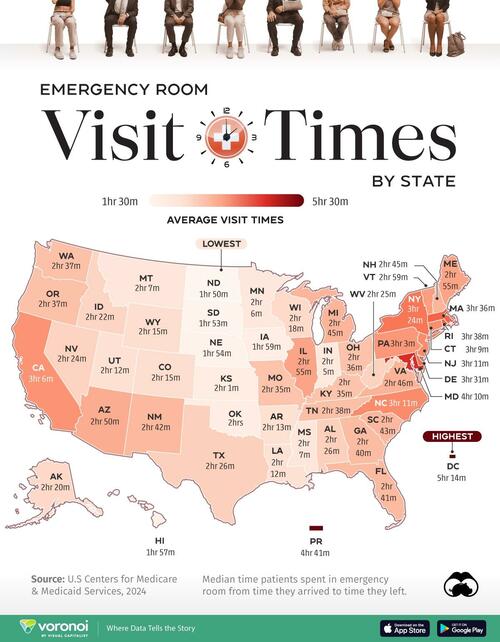Which State Has The Longest Emergency Room Visit Time?

Which State Has The Longest Emergency Room Visit Time?
Emergency room wait times vary significantly across the United States depending on factors such as hospital resources, patient volume, and staffing levels, with some states facing delays that can stretch for more than three hours.
Long stays in the emergency department often point to issues like understaffing or overcrowding, leading to delays in treatment, and often times, worse patient health outcomes.
This map, via Visual Capitalist's Kayla Zhu, visualizes the average time patients spend in the emergency department before leaving, by U.S. state and territory.
Data comes from the U.S. Centers for Medicare & Medicaid Services and is updated as of Oct. 30, 2024.
This data reflects the average time patients spend at the emergency department, from the time they arrive to the time they leave, and excludes those who died in the emergency department, left without the approval of a licensed provider, or lacked documented discharge destinations.
Which State Has the Longest Emergency Room Visit Time?
Below, we show the average time patients spent in the emergency room before leaving, by state.
| Rank | State/Territory | Average time patients spent in the emergency room before leaving |
|---|---|---|
| 1 | District of Columbia | 5 hrs 14 min |
| 2 | Puerto Rico | 4 hrs 41 min |
| 3 | Maryland | 4 hrs 10 min |
| 4 | Rhode Island | 3 hrs 38 min |
| 5 | Massachusetts | 3 hrs 36 min |
| 6 | Delaware | 3 hrs 31 min |
| 7 | New York | 3 hrs 24 min |
| 8 | North Carolina | 3 hrs 11 min |
| 9 | New Jersey | 3 hrs 11 min |
| 10 | Connecticut | 3 hrs 9 min |
| 11 | California | 3 hrs 6 min |
| 12 | Pennsylvania | 3 hrs 3 min |
| 13 | Vermont | 2 hrs 59 min |
| 14 | Illinois | 2 hrs 55 min |
| 15 | Maine | 2 hrs 55 min |
| 16 | Arizona | 2 hrs 50 min |
| 17 | Virginia | 2 hrs 46 min |
| 18 | Michigan | 2 hrs 45 min |
| 19 | New Hampshire | 2 hrs 45 min |
| 20 | South Carolina | 2 hrs 43 min |
| 21 | New Mexico | 2 hrs 42 min |
| 22 | Florida | 2 hrs 41 min |
| 23 | Georgia | 2 hrs 40 min |
| 24 | Tennessee | 2 hrs 38 min |
| 25 | Oregon | 2 hrs 37 min |
| 26 | Washington | 2 hrs 37 min |
| 27 | Ohio | 2 hrs 36 min |
| 28 | Kentucky | 2 hrs 35 min |
| 29 | Missouri | 2 hrs 35 min |
| 30 | Alabama | 2 hrs 26 min |
| 31 | Texas | 2 hrs 26 min |
| 32 | West Virginia | 2 hrs 25 min |
| 33 | Nevada | 2 hrs 24 min |
| 34 | Idaho | 2 hrs 22 min |
| 35 | Alaska | 2 hrs 20 min |
| 36 | Wisconsin | 2 hrs 18 min |
| 37 | Colorado | 2 hrs 15 min |
| 38 | Wyoming | 2 hrs 15 min |
| 39 | Arkansas | 2 hrs 13 min |
| 40 | Louisiana | 2 hrs 12 min |
| 41 | Utah | 2 hrs 12 min |
| 42 | Mississippi | 2 hrs 7 min |
| 43 | Montana | 2 hrs 7 min |
| 44 | Minnesota | 2 hrs 6 min |
| 45 | Indiana | 2 hrs 5 min |
| 46 | Kansas | 2 hrs 1 min |
| 47 | Oklahoma | 2 hrs |
| 48 | Iowa | 1 hr 59 min |
| 49 | Hawaii | 1 hr 57 min |
| 50 | Nebraska | 1 hr 54 min |
| 51 | South Dakota | 1 hr 53 min |
| 52 | North Dakota | 1 hr 50 min |
The median emergency room visit time in 2024 in the U.S. was 2 hours and 42 minutes. Twenty states had average emergency room visit times higher than the national average.
Washington, D.C. residents had the longest average emergency department visit times at 5 hours and 14 minutes, followed by Puerto Rico at 4 hours and 41 minutes.
These extended wait times in D.C. and Puerto Rico are likely due to a combination of high population density, limited healthcare resources, and potentially higher rates of uninsured patients seeking emergency care.
Rural and less populated states like North Dakota (1 hour 50 minutes), South Dakota (1 hour 53 minutes), and Nebraska (1 hour 54 minutes) had the shortest emergency room times, suggesting that lower patient loads and less crowded facilities contribute to faster processing.
Long emergency department waits worsen patient health, raise healthcare costs, and strain hospital resources, increasing risks of mortality and compromised care.
A University of South Caroline study found that prolonging the wait of a patient who arrives with a serious condition by 10 minutes will increase the hospital’s cost to care for the patient by an average of 6%.
To learn more about the health care landscape in the U.S., check out this graphic that visualizes the largest health insurance company in each U.S. state.


